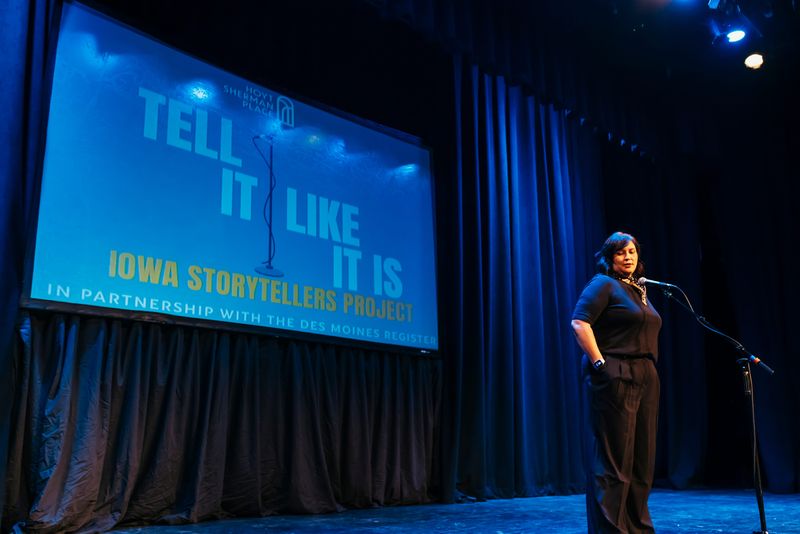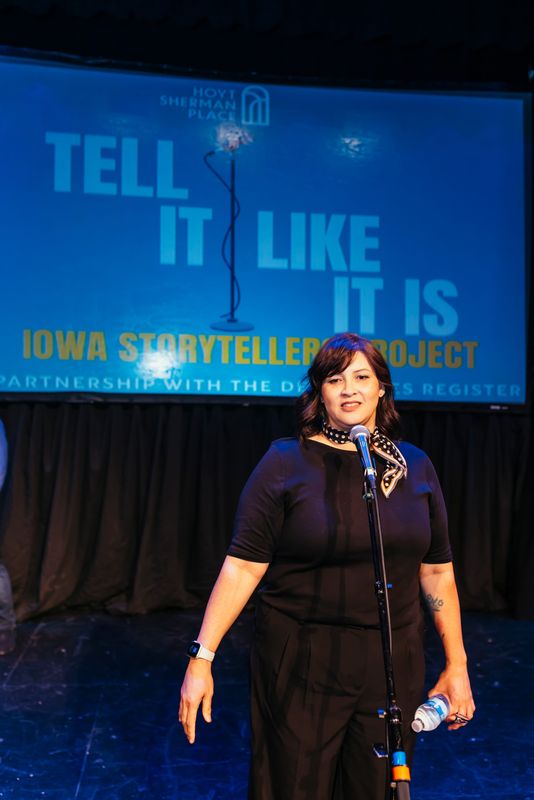This “Back to School” story was told Sept. 9 as part of Tell It Like It Is: Iowa Storytellers Project, a project funded by the Hoyt Sherman Place Foundation in partnership with the Des Moines Register. It can be republished by any Iowa newspaper. The next event is Feb. 10 with a theme of “Hearts on Fire.” Charitable proceeds from this year’s event helps finance Register internships.

Sarah Scull as told to John Sorrell
When I dropped out of high school at 15, it confused people.
I came from a good family. My mother worked, but she still managed to make sure lunches were packed, dinner was made, and we dressed well. Dad was super patient and wise; always available to chat and ready with advice, whether or not I wanted to hear it.
I had everything you could have wanted for a child: a beautiful home, after-school activities, access to tutors and therapy, family vacations, and parents who would have done anything for me. By every measure, I had every advantage and no reason to fail.
But despite all my privilege, I was a challenged student. And what made me that way wasn’t visible. I had undiagnosed ADHD. I was a nontraditional learner in a system built for conformity. I carried invisible wounds from adoption grief I didn’t yet have words for. And when most of my peers were studying for the SAT or learning how to drive, I was collapsing under the weight of assault and the pain of giving up my child.
My adverse childhood experience wasn’t chaos. It was invisibility. I wasn’t neglected. In fact, it was the opposite of that. I was supported, but deeply misunderstood. I felt misunderstood by peers who bullied me, by teachers who didn’t trust my mind, and by my parents who didn’t understand my grief and were doing everything right. I was misunderstood by a world of people that thought because I looked OK, I must be. So, I stopped trying, started skipping classes, and one day, I just disappeared from school altogether.
What followed was a blur of California coastline, restaurant dumpsters and beach showers. I drifted, and I survived. Don’t get me wrong, I chose that life, and I felt incredibly free. But freedom without grounding is just falling.
Eventually, I fell too hard and I woke up in the emergency room after an overdose. Since I was a minor, my parents were called. And they showed up, like they always do. I didn’t plan for that family reunion that day, but if I’m being honest, I was relieved to see them. Hopefully, you’ve never had to sleep in cars or on the street, because it’s incredibly difficult.
I don’t remember much from that day, but what I do remember were my parents holding my hands like they’d never stopped waiting for me to come home.
And, while it didn’t happen overnight, eventually, I found my way back.
My parents enrolled me in a program through the Charter Schools of San Diego. That’s where I met a teacher named Marilyn Hauck. When I think back to meeting Marilyn, I can’t help but think of her smile. I was such a disappointment to so many for so long, I forgot what it was to be greeted that way. Marilyn didn’t lecture or judge. Instead, she asked about me and what I needed. She listened. She taught me how to turn my survival from the street into success in the classroom. Instead of expressing frustration, she responded to my pain by calling me “brave.”
In 2012, I moved to Iowa with my family in search of something better. My former husband convinced me that Iowa was top-notch in education. Progressive, even. But four years later, I noticed my daughter starting to break under a different version of the same weight — the bullying, isolation, a system that didn’t fit.
Because I saw my 16-year-old self in her, I did something that alarmed her guidance counselor and more than a few teachers: I walked with her into school, the morning of junior year midterms, and withdrew her. And I didn’t have a plan.
Not long after, I enrolled her in the High School Equivalency Diploma program, or HiSED program, at Southwestern Community College. Because of that program, she was able to graduate early and move back to the West Coast.
I often think of the day she drove away. I stood at the window of my dining room. My heart was pounding, and I was trying to feel happy and hopeful for her. Instead, I felt like I’d somehow failed her, too.
This past spring, I found myself dwelling in those memories. This time, I was sitting in my car, crying, parked outside the town depot. So, I called her. And during that conversation, she told me what I had done was the greatest thing I had done for her.
She said, “Mom, if anything, I felt liberated. You did that.”
Liberated. That word cut me open. Think about what it means. When I was that age, I wanted nothing more than to feel whole, to be free from my pain. As I look back, I realize my experience and instinct helped her make it through with her dignity intact. Part of me also recognizes that my experience of helping her made me realize I could help more people in a similar and more intentional way. And I did.
Three years ago, I became a full-time HiSET instructor. No teaching license of degree in education. What I offered are my instincts, a bachelors, and a lived résumé.
I’ll never forget my first student. Yes, my first class had one student. After a few sessions, he caught on to me. He looked me dead in the eyes and asked, “Do you even know what you’re doing?”
I didn’t. Not yet. But I knew what not to do. I knew I was never going to be the teacher who said “try harder” to someone already trying to survive. Or, “if you just apply yourself” to someone doing the very best they can that day. Instead, I paid attention to who was hungry, who wasn’t dressed for the weather, who sat silent in the back. I also noticed the ones with the biggest smiles and class clowns, because pain and frustration often hides behind a mask.
For the duration of my time teaching in that program, I had private conversations with every one of my students. When I asked what they needed, not a single one said, “test preparation.” They said, “Food.Toiletries. A ride. A shower. Laundry.” Some needed shelter, others employment. Some just wanted someone who believed them. But every one of them needed someone to believe in them.
In Iowa, nearly 8% of working-age adults don’t have a high school diploma. And what I mean by “working age,” I’m talking about residents between the ages of 18 and 64. That’s tens of thousands of people shut out of better jobs, living wages and opportunity before they even have a chance to prove themselves.
They are resourceful and smart people. Those were my students. My students weren’t lazy. They were tired. Grieving. Parenting. Working. Recovering. Unsupported. Trying to earn a diploma while carrying burdens most of us would buckle under.
My students and experience taught me something really important, and it’s this: Rewards and the fear of punishment don’t always motivate people. No prize or amount of money could have ever inspired me to do better.
As for punishment? Most of my students scoffed at the threat of it. For them, they lived it every day — at home, in school, in the community. Consequences without understanding — that doesn’t change people.Instead of focusing on rewards and punishment, I focus on why. Why are you here? What happened to you? Where do you want to be?
Without understanding those things, any attempt to help someone isn’t really about them. It’s about me.
I share all this because this might be the reminder someone needs — that change is possible, so is growth. And what we often overlook or misunderstand makes a difference in how someone else moves through the world. It might even mean that a struggling student needs something much more basic than an individualized education plan.
As I continue to meet people with different sets of life experience and struggles, I’m reminded that not a single one of us is beyond redemption.
And all it takes is one person willing to believe it’s possible.
This article originally appeared on Des Moines Register: She learned freedom without grounding is just falling
Reporting by John Sorrell / Des Moines Register
USA TODAY Network via Reuters Connect



